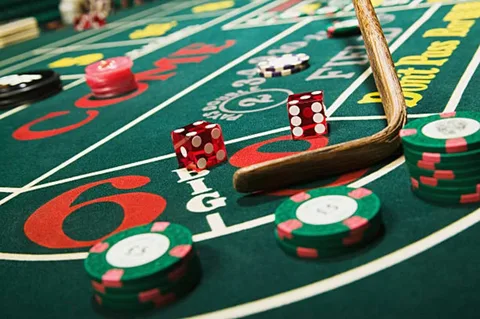The allure of the casino floor, whether bathed in the opulent glow of a land-based establishment or pulsating through the screen of an online device, is undeniable. It’s a world designed to captivate, excite, and keep players engaged. But behind the flashing lights and thrilling sounds lies a sophisticated understanding of human psychology, meticulously applied to shape our gaming experience. Far from being random collections of casinos not on GamStop games, casinos leverage a range of psychological principles to draw players in and encourage continued play.
Table of Contents
Toggle1. The Power of Variable Ratio Reinforcement
At the core of many casino games, particularly slot machines, lies a powerful psychological concept known as variable ratio reinforcement. This is a schedule of reinforcement where rewards are delivered after an unpredictable number of responses.
- How it Works: Unlike fixed schedules (e.g., getting a reward every 5 actions), variable ratio schedules create a strong, consistent response because the player never knows when the next win will occur. The anticipation of an uncertain reward triggers a dopamine release in the brain – the “feel-good” neurotransmitter associated with pleasure and motivation.
- Casino Application: Slot machines are masters of this. A player might spin many times without a win, then hit a small win, then a larger one, then nothing for a while again. This unpredictability keeps players engaged, constantly chasing that elusive, yet seemingly imminent, big payoff.
2. The Allure of Near Misses
Few things are as frustrating, yet paradoxically motivating, as a “near miss.” This psychological phenomenon is expertly exploited in many casino games.
- How it Works: A near miss occurs when a player comes tantalizingly close to a win but falls just short (e.g., two out of three jackpot symbols lining up on a slot machine, or the roulette ball landing right next to your chosen number). Research shows that near misses activate the same reward pathways in the brain as actual wins, albeit to a lesser extent.
- Casino Application: These “almost” wins trick the brain into believing success is just around the corner, fueling a desire to keep playing. Players might interpret near misses as evidence of skill or that their luck is improving, rather than simply a random outcome designed to keep them engaged.
3. The Illusion of Control
Humans naturally desire control over their environment, even in situations where outcomes are purely random. Casinos cleverly tap into this cognitive bias.
- How it Works: In games of pure chance, like roulette or slots, players might engage in behaviors that give them a false sense of control – blowing on dice, pressing slot buttons in a particular rhythm, or choosing “lucky” numbers. Even in skill-based games like blackjack, players might overestimate their actual ability to influence outcomes.
- Casino Application: Game designs often incorporate elements that foster this illusion. For instance, in some slot bonus rounds, players “pick” items to reveal prizes, even though the outcome is predetermined. This sense of agency makes players feel more invested and accountable for the results, encouraging continued play.
4. Sensory Overload: Lights, Sounds, and Environment
Casinos are master architects of atmosphere, meticulously crafting environments that stimulate the senses and disorient the perception of time.
- How it Works:
- Lights and Sounds: Flashing lights, upbeat music, and celebratory jingles for even small wins create a constant stream of positive reinforcement, associating the gambling act with excitement and reward. The ambient “winning” sounds (even if not from your machine) can create a pervasive sense that wins are happening all around you.
- No Clocks or Windows: Most land-based casinos famously lack clocks or windows, removing external cues about the passage of time. This can lead players to lose track of hours spent gambling.
- Comfort and Convenience: Free drinks, comfortable seating, and easy access to services aim to remove any reason for players to leave the gaming floor.
- Casino Application: This sensory rich, time-distorting environment is designed to keep players immersed, focused on the game, and less aware of the money or time they are spending.
5. Losses Disguised as Wins (LDWs)
A particularly clever psychological trick, especially prevalent in slot machines, is the “loss disguised as a win.”
- How it Works: This occurs when a player’s payout is less than their initial bet, but the machine celebrates it as a win with flashing lights, triumphant sounds, and often coins cascading. For example, if a player bets $1 but wins only $0.20, the machine still puts on a “winning” show.
- Casino Application: LDWs blur the lines between winning and losing, making losses feel less impactful and encouraging continued play. The brain registers the “win” stimulus, overriding the fact that money was actually lost overall.
6. Cognitive Biases: The Mind’s Shortcuts
Several well-known cognitive biases come into play in gambling:
- Gambler’s Fallacy: The mistaken belief that past events influence future independent events (e.g., “red has come up five times, so black is ‘due’ next”).
- Confirmation Bias: Players tend to seek out and interpret information in a way that confirms their existing beliefs (e.g., remembering wins more vividly than losses).
- Availability Heuristic: Overestimating the likelihood of events that are easily recalled (e.g., seeing a big jackpot win makes you think winning one is more probable).
Conclusion: Playing with Awareness
The world of casino games is a masterclass in applied psychology. By understanding the principles of variable reinforcement, near misses, the illusion of control, sensory manipulation, and inherent cognitive biases, players can gain a critical awareness of how these environments are designed. This isn’t about outsmarting the system, as the house edge remains an undeniable mathematical reality. Instead, it’s about empowering oneself to make more informed decisions, play responsibly, and truly enjoy the entertainment value of casino games without falling prey to their subtle psychological triggers. Awareness is the first step towards a more controlled and enjoyable gambling experience.




